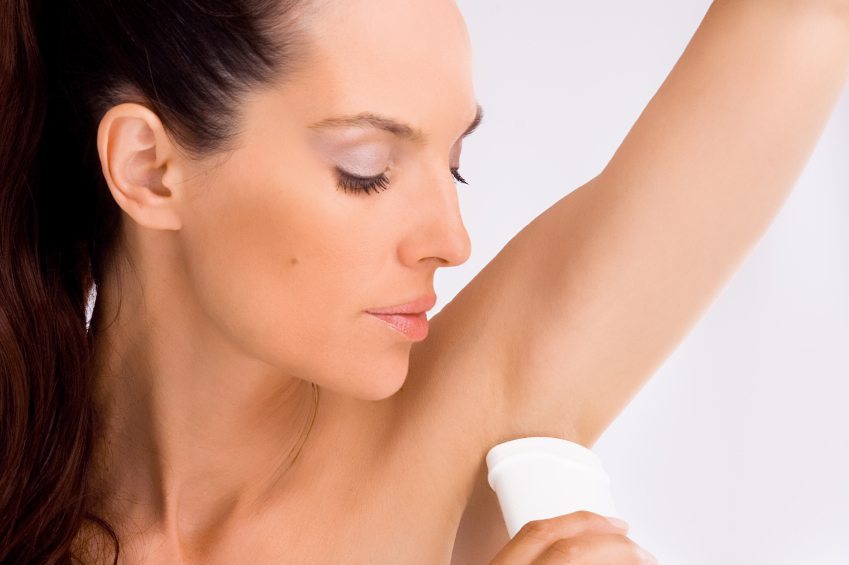
Whether you use deodorants or antiperspirants (what’s the difference anyways?), there are some things you should know other than that it masks the smell of your own odor.
Of course, we put it on everyday (or so we hope) and it just seems like second nature by this point as part of our morning routine. As we all become more aware of every single thing we put into our bodies, however, we should be just as careful when it comes to what we put on our bodies. You wouldn’t use something for your face that would be potentially harmful, right? So what is so different about under your arms?
Fun Fact: According to Huffington Post, the first trademarked deodorant was in 1888 called Mum. The first antiperspirant was called EverDry and came 15 years later.
So what is the difference between the two? Deodorants prevent unwanted odors from our sweat and are designed to mask or eliminate the smell caused by our own bacteria. Side note: it does NOT prevent sweat, but wouldn’t that be nice for those who use it?
Antiperspirants, on the other hand, are designed to prevent our bodies from producing sweat at all by blocking sweat from reaching the skin. Aluminum is the main ingredient found in antiperspirants and it blocks the pores so sweat cannot pass through. Research shows that the aluminum is what causes the yellow staining on clothing, I’m sure everyone has wondered one time or another where the yellow “pit-stain” on the brand new white shirt comes from. Well, it’s actually aluminum plus sweat.
On interesting (albeit unfortunate) thing to note is that it’s much harder to find an all natural antiperspirant than an all natural deodorant.
Health Risks
The aluminum found in antiperspirants, like I said before, blocks the pores so that sweat cannot come through. Over the years, some theories have shown that clogging the pores and lymph nodes has a connection to breast cancer, although no scientific research has proven this. Another theory states that the aluminum gets absorbed by the skin and affects the blood brain barrier linking it to the onset of Alzheimer’s disease. Again, no scientific facts but people do truly believe it. Many ingredients found in deodorants can cause irritation to the skin, which is likely due to an allergen. If this happens try a fragrance free or all natural alternative.
Does It Matter If You’re A Man or Woman?
Women actually have more sweat glands while men’s sweat glands produce more sweat. Make sense? When it comes to the deodorant itself though, there is barely any difference. The same ingredients are found in products for men and women. It’s just the look and smell that change (we’re all falling for the marketing ploy!). If you think men’s deodorant is stronger, that is actually not the case at all. They do make unisex deodorants but those are not nearly as popular as ones for just men or just women.
You Might Not Even Need It
Some people don’t! Most people don’t even smell as bad as they think they do, and some, if they come from a line of good smelling genes, don’t need any at all. Take a look at this brave man who went 10 days without deodorant or antiperspirant (or scented soap, shampoo, cologne or detergent) to see if he truly smelled or he was falling for the people who were making him think he needed it.

So what’s the deal? There have been a number of studies done to specifically look at whether deodorants and antiperspirants increase breast cancer risk and Alzheimer’s disease, but unfortunately the findings are mixed and unclear. We need more research to prove whether this is something that we are all in risk of or not. But if this so-so information gets you to start thinking of other alternatives, you should know what else is out there. There are, indeed, some fantastic alternatives. Look through your local health food or organic grocery store. There are going to be products for your hair, skin, nails and more- which are all-natural. Take a look at the ingredients list and be sure to choose the ones with organic coconut oil, powdered sugar (prevents odor-causing bacteria when combined with sweat), baking soda or natural beeswax.
If you want to try to make your own at home, use this amazing recipe from Thank Your Body!
For more Pretty & Pamper features, check out our articles here.
What kind of deodorant works for you?









![Daily Bite [Make]: Philly Cheesesteak Stuffed Bell Peppers](https://dashofwellness.com/wp-content/uploads/2013/01/Philly-Cheesesteak-Stuffed-Pepper-Daily-Bite-1-100x70.png)

I really love natural deodorant that works! I love primal pit paste!!! 🙂
Article writing is also a fun, if you know then you can write or else it is complex to write.